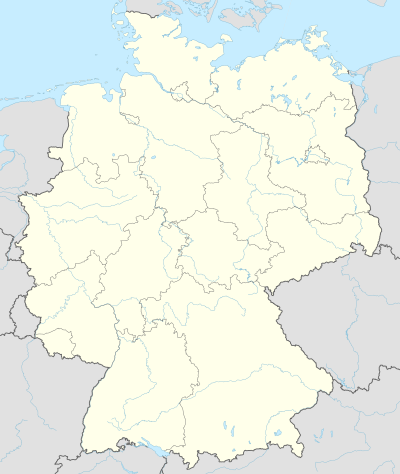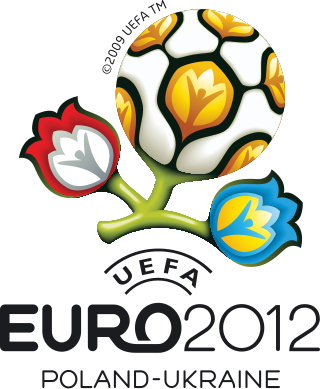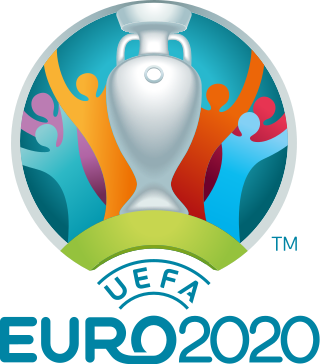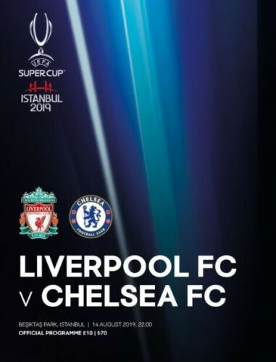Bids
UEFA announced that only two countries, Germany and Turkey, had announced their intentions to host the tournament. [2] [3]
On 21 September 2018, UEFA published its UEFA Euro 2024 bid evaluation report. [12] [13] The German Football Association and the Turkish Football Federation published also their respective bid book. [12] [14] [15]
Germany
On 23 October 2013, the executive committee of the German Football Association (DFB), under president Wolfgang Niersbach, had voted to place a bid for hosting the tournament. This was announced publicly the following day on 24 October 2013 at the 41st DFB-Bundestag in Nuremberg. [16] [17] [18] On 20 January 2017, the DFB executive committee under president Reinhard Grindel unanimously confirmed the bid for UEFA Euro 2024. [19] [20] [21] On 1 March 2017, the DFB submitted an official declaration of interest to UEFA General Secretary Theodore Theodoridis. [22]
Previously, UEFA Euro 1988 had been held in West Germany, as well as the 1974 FIFA World Cup and the 2006 FIFA World Cup. German media has also reported that the DFB was willing to let Wembley Stadium host the final for UEFA Euro 2020, in return for support from The Football Association for Germany's 2024 bid.
Until 17 February 2017, cities and stadiums interested in hosting the tournament were able to submit a non-committal statement of interest to the DFB. [23] By the deadline, 18 cities and stadia had submitted the necessary documents, including the 12 hosts of the 2006 FIFA World Cup. [24] The DDV-Stadion in Dresden was the first stadium turned down on 1 March 2017, as it failed to meet the mandatory capacity of 30,000 seats. [22] The formal application procedure began on 11 April 2017, with a total of 17 potential venues requesting bidding documents. [25] The city of Freiburg im Breisgau withdrew its bid on 25 April 2017, citing that the guidelines announced by the DFB would not result in a promising application for the stadium. [26] On 26 April 2017, the city of Karlsruhe withdrew its application. [27] A total of 15 cities expressed their interest in hosting by the 26 April 2017 deadline. [28] The Fritz-Walter-Stadion in Kaiserslautern later withdrew its bid on 15 May 2017 due to "irresponsible financial risk", leaving 14 cities remaining. [29]
According to UEFA requirements, stadiums had to at least have a capacity of 30,000 seats publicly available seats (not including media seating and places with a restricted view). The cities of Freiburg im Breisgau and Karlsruhe planned their bids with respective new stadia.
The full application documents for the cities had to be submitted to the DFB by 10 July 2017. This date was originally 12 June 2017, but it was postponed due to a delay in receiving documents from UEFA. [30] [31] All 14 remaining cities submitted their applications to the DFB by the deadline. The DFB's application committee evaluated the submitted documents in the following weeks. In addition, as of the end of July 2017, the DFB visited all 14 stadiums in order to take into account the conditions and examine the possible reconstruction and expansion plans. [32]
The selection criteria used for the venues was primarily the stadium capacity. In order to allow as many spectators as possible for the European Championship, the DFB increased the net seating capacity required by UEFA for three stadiums from at least 50,000 to at least 60,000. Other criteria included security aspects and infrastructure. On the basis of these qualitative criteria and the application documents of the cities, a ranking of the applicant venues was established by the DFB's application committee. To ensure that the European Championships take place throughout Germany as a whole, a regional classification of the applicants was carried out in four zones spread across the country. From each of the four zones, one to four stadiums could be chosen. [33] Zone I (north) included Bremen, Hamburg, and Hanover. Zone II (west) was assigned to Cologne, Dortmund, Düsseldorf, Gelsenkirchen, and Mönchengladbach. Zone III (south) included Frankfurt, Munich, Nuremberg, and Stuttgart. Zone IV (east) included Berlin and Leipzig. [34]
The candidate cities had to make commitments to UEFA, for example, that within the "commercial zone" of 500 meters around the stadiums that political and religious demonstrations would be prevented. The cities also had to enact laws to protect UEFA's marketing rights. This included preventing pubs near the stadiums from broadcasting matches on large screens. Wolfgang Hoffmann-Riem, former Federal Constitutional Court judge, considered parts of the requirements unconstitutional. First, interventions in the freedom of assembly were not allowed for commercial interests. Also, only parliaments, not cities, had the power to legislate. Finally, the ban on large screens in nearby restaurants was an unlawful interference of occupational freedom. The leaders of the city of Bremen shared these concerns, while officials in Hamburg and Leipzig did not see any concerns. [35] However, the DFB responded that the UEFA regulations were to ensure safety and security around the host stadiums, and that cities were not required to enact laws relating to UEFA marketing rights. [36]

Taking into account all these criteria and conditions, the DFB executive committee selected the final 10 cities and stadia as candidate venues from the remaining 14 applicants on 15 September 2017. The executive committee unanimously followed the recommendation of the DFB bid committee, which had ranked the 14 applicants. Berlin, Cologne, Dortmund, Düsseldorf, Frankfurt, Gelsenkirchen, Hamburg, Leipzig, Munich, and Stuttgart were all selected, having been ranked from 1–10. The Max-Morlock-Stadion in Nuremberg, HDI-Arena in Hanover, Borussia-Park in Mönchengladbach, and Weser-Stadion in Bremen were all dropped from the final bid, having been ranked from 11 to 14. [37] [38] The zoning rule did not have to be applied, since according to the ranking no more than four and at least one venue per zone were ranked in the top ten.
The following were the host cities and stadia selected for Germany's bid: [39]
- Berlin – Olympiastadion, capacity 74,461 [a] [b]
- Munich – Allianz Arena, capacity 70,076 [b]
- Dortmund – Westfalenstadion, capacity 65,849 [a] [b]
- Gelsenkirchen – Arena AufSchalke, capacity 54,740 [b]
- Stuttgart – MHPArena, capacity 54,697 [a] [c] [b]
- Hamburg – Volksparkstadion, capacity 52,245 [a] [c] [b]
- Düsseldorf – Esprit Arena, capacity 51,031
- Cologne – Müngersdorfer Stadion, capacity 49,827 [b]
- Leipzig – Red Bull Arena, capacity 49,539 [b]
- Frankfurt – Waldstadion, capacity 48,387 [a] [c] [b]
Until the end of September, applications for team base camp locations were accepted by the DFB. Each of the 24 teams requires a base camp before and during the tournament for accommodation and training facilities. A team base camp consists of a hotel or accommodation facility with appropriate comfort, privacy, and safety standards as well as a nearby, first-class training facility. Good infrastructure is required around the base camp, including a nearby airport. A base camp is also needed for the UEFA referees for the tournament. [40] [41]
On 25 August 2017, the DFB announced that the logo of the German application would be determined by a design contest on the "jovoto" platform. [42] There, creative members submitted potential designs. A total of 2,076 designs were submitted by 990 participants from 82 countries. The community on the platform then selected 20 potential logos in a voting phase, with the DFB choosing 5 additional logos. The 25 proposals were evaluated by a jury consisting of DFB executives and experts from the design and communications industry, as well as representatives from the sports world, with the top 5 submissions being announced on 15 September 2017. [43] An online vote on "fussball.de" took place from 15 to 22 September 2017 between the five remaining logos to determine the winning design which would be used for the German bid. [44] The winning logo was used on the "bid book" which the DFB submitted to UEFA, along with all communicative actions relating to the DFB bid. [45] [46] The winning logo was presented by the DFB on 7 October 2017, with 44% of the votes in favour of the draft by Serbian graphic designer Igor Petrović. The logo features two hearts and a "24" in the Germany national colours of black, red, and gold. [47]
On 14 November 2017, the DFB announced the official motto of the German bid: "United by Football – Vereint im Herzen Europas" (United by Football – United in the Heart of Europe). In order to show their support for the Germany bid, the Germany national team players wore badges on their kits with the German bid logo during the international friendly match against France in Cologne on the same day. The slogan, along with the bid logo, was used in all communicative measures by the DFB in connection with the bid. The official bid website "united-by-football.de" was also unveiled on 14 November. [48]
On 24 April 2018, the DFB officially submitted their bid book to UEFA. [49]
Turkey
In April 2014, the Turkish Football Federation (TFF) announced they would not bid for the semi-finals and final for UEFA Euro 2020, but rather plan a bid for hosting UEFA Euro 2024. [50] On 15 February 2017, the TFF confirmed the Turkish bid. [51] This was done after Turkey was denied the organisation while the country had confirmed their interest in hosting Euro 2020 with UEFA in the spring of 2012. [52] Even the deadline for declarations of interest which was at midnight on 15 May 2012 was extended by UEFA to welcome other bids on 16 May. [53] [54] Including the UEFA Euro 2024 bid, this was the fifth consecutive unsuccessful bid for UEFA Euro organisations. Turkey had only previously hosted one major football tournament, the 2013 FIFA U-20 World Cup. However, the country previously attempted to host the European Championship in 2008 (in a joint bid with Greece), 2012, and 2016, but failed on all occasions. [2] On 20 October 2017, the TFF announced the venues for the Turkish bid following a meeting of the bid committee. [55]

The following were the host cities and stadia selected for Turkey's bid: [55]
- Ankara – New Ankara Stadium, capacity 65,307 [56]
- Antalya – New Antalya Stadium, capacity 43,616 [56]
- Bursa – Timsah Arena, capacity 43,331 [56]
- Eskişehir – New Eskişehir Stadium, capacity 34,930 [56]
- Gaziantep – New Gaziantep Stadium, capacity 35,219 [56]
- Istanbul – Atatürk Olympic Stadium, capacity 92,208 [56]
- Istanbul – Türk Telekom Stadium, capacity 53,611 [56]
- İzmit – İzmit Stadium, capacity 34,712 [56]
- Konya – Konya Büyükşehir Stadium, capacity 37,829 [56]
- Trabzon – Şenol Güneş Stadium, capacity 43,233 [56]
The bid logo and slogan were unveiled on 19 January 2018. The logo was inspired by the heart with football, and the star from the Turkish flag combined with the number "24" represented the year 2024 and the Turkish national flag colours. The logo was designed by Turkish graphic designer Erhan Yalur. Turkey announced the official slogan as Share Together (Turkish: Birlikte Paylaşalım) for the competition. [57]
On 26 April 2018, the TFF officially submitted their bid book to UEFA. [58]













